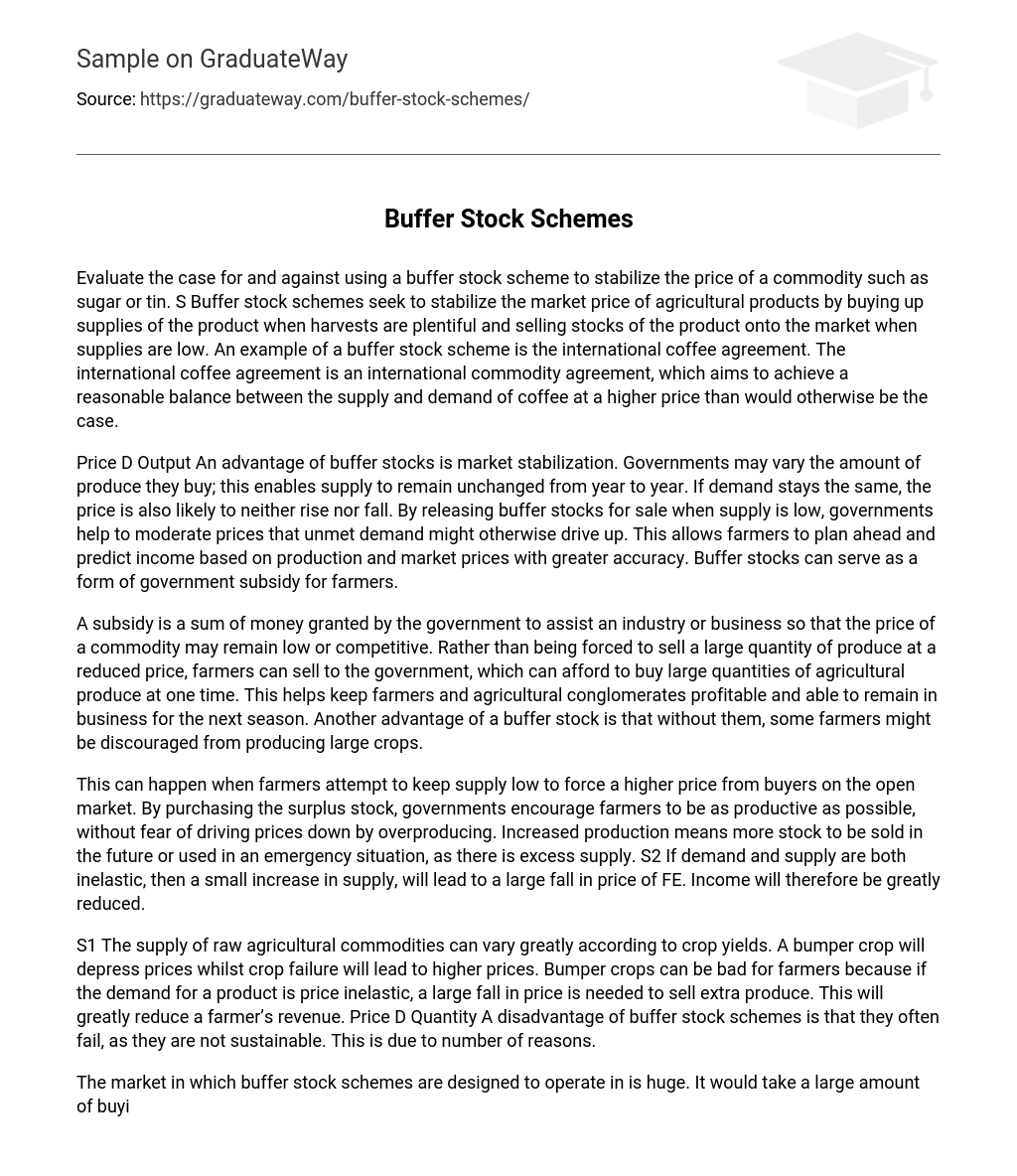Evaluate the case for and against using a buffer stock scheme to stabilize the price of a commodity such as sugar or tin. S Buffer stock schemes seek to stabilize the market price of agricultural products by buying up supplies of the product when harvests are plentiful and selling stocks of the product onto the market when supplies are low. An example of a buffer stock scheme is the international coffee agreement. The international coffee agreement is an international commodity agreement, which aims to achieve a reasonable balance between the supply and demand of coffee at a higher price than would otherwise be the case.
Price D Output An advantage of buffer stocks is market stabilization. Governments may vary the amount of produce they buy; this enables supply to remain unchanged from year to year. If demand stays the same, the price is also likely to neither rise nor fall. By releasing buffer stocks for sale when supply is low, governments help to moderate prices that unmet demand might otherwise drive up. This allows farmers to plan ahead and predict income based on production and market prices with greater accuracy. Buffer stocks can serve as a form of government subsidy for farmers.
A subsidy is a sum of money granted by the government to assist an industry or business so that the price of a commodity may remain low or competitive. Rather than being forced to sell a large quantity of produce at a reduced price, farmers can sell to the government, which can afford to buy large quantities of agricultural produce at one time. This helps keep farmers and agricultural conglomerates profitable and able to remain in business for the next season. Another advantage of a buffer stock is that without them, some farmers might be discouraged from producing large crops.
This can happen when farmers attempt to keep supply low to force a higher price from buyers on the open market. By purchasing the surplus stock, governments encourage farmers to be as productive as possible, without fear of driving prices down by overproducing. Increased production means more stock to be sold in the future or used in an emergency situation, as there is excess supply. S2 If demand and supply are both inelastic, then a small increase in supply, will lead to a large fall in price of FE. Income will therefore be greatly reduced.
S1 The supply of raw agricultural commodities can vary greatly according to crop yields. A bumper crop will depress prices whilst crop failure will lead to higher prices. Bumper crops can be bad for farmers because if the demand for a product is price inelastic, a large fall in price is needed to sell extra produce. This will greatly reduce a farmer’s revenue. Price D Quantity A disadvantage of buffer stock schemes is that they often fail, as they are not sustainable. This is due to number of reasons.
The market in which buffer stock schemes are designed to operate in is huge. It would take a large amount of buying and selling to influence these commodity markets. It is often the case that the government/ agencies do not have the funds required to undertake an operation on this scale. Buffer stocks artificially control inflation, adding to or subtracting from supply. The result is often that the market price is above the point at which supply meets demand. This means more money for farmers, but also higher prices for consumers.
The storage of commodities can be very expensive; this is because some of them have to be store in controlled conditions and some stock being perishable over a long period of time. This leads to an opportunity cost, as the government spending is restricted. If supply continues to increase without disruption then it will mean the government has to purchase more surplus stock, which can become very costly. In conclusion, I believe that Buffer Stock schemes are not the right to solution to maintaining a commodity market.
In my opinion the best form of intervention is that of governments, giving subsidies to farmers. However, this might not be practical as if prices get too high; it is inconceivable that governments would put tax on commodities such as apples, which are a merit good. This would require international co-operation which is possible as seen in the Common Agricultural policy within the EU which gives subsidies to farmers in less developed countries but international co-operation is not very common due to the large amount of bureaucracy that is present in governments.





